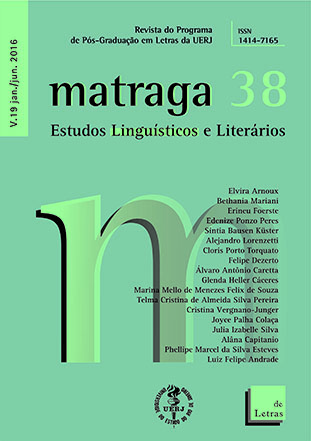The Français Langue Etrangère and the international redistribution of the French language teaching: the Brazilian case
DOI:
https://doi.org/10.12957/matraga.2016.21206Keywords:
history of linguistic ideas, discourse analysis, français langue étrangère, French language teaching, textbooksAbstract
The present work aims at analyzing the discursive process that sustains the production and circulation of the knowledge that has integrated the middle school French language teaching manuals in Brazil based on the institutionalization of the Français Langue Etrangère (FLE) in France, since the second half of the 20th century. This institutionalization is here understood as language policy, once it focuses on the teaching process so as to centralize and control what circulates within the French language as a foreign language school subject. Therefore, we selected as material the book Pixel 1, méthode de français, by Catherine Favret and Silvie Schmitt, edited in Paris by the Editora Clé International, in 2011. Regarding their theoretical background, these analysis can be placed in the encounter of the History of Linguistic Ideas (Auroux, 2009 et alii) with the Discourse Analysis (Pêcheux [1975]1988 et alii Orlandi, 1996, 2003, 2005, et alii), as it has been developed in Brazil from Eni Orlandi’s works (2001, 2002, 2007, et alii). Understood as a discursive process, the institutionalization of the FLE in the Brazilian education produces images of a French language that elects France as its starting and belonging point, placing the national French language as the way that leads to the old metropolis, erasing the heterogeneity that composes the French community and the countries where French circulates, with different statutes.
---
http://dx.doi.org/10.12957/matraga.2016.21206
Downloads
Downloads
Published
How to Cite
Issue
Section
License
Authorization
Matraga – Scientific Journal of the Post-graduate Program in Arts and Humanities of UERJ is authorized to publish the article submitted here, if it is accepted for online publication. It is attested that the contribution is original, that it is not being submitted to another publisher for publication, and that this statement is the expression of truth.
The works published in Matraga's virtual space – Scientific Journal of the Post-graduate Program in Arts and Humanities of UERJ will be automatically transferred, and your copyright is reserved to Matraga. Its reproduction, in whole or in part, is conditional on the citation of the authors and the data of the publication.

Matraga uses license Creative Commons - Attribution-Non-Commercial 4.0 International.





